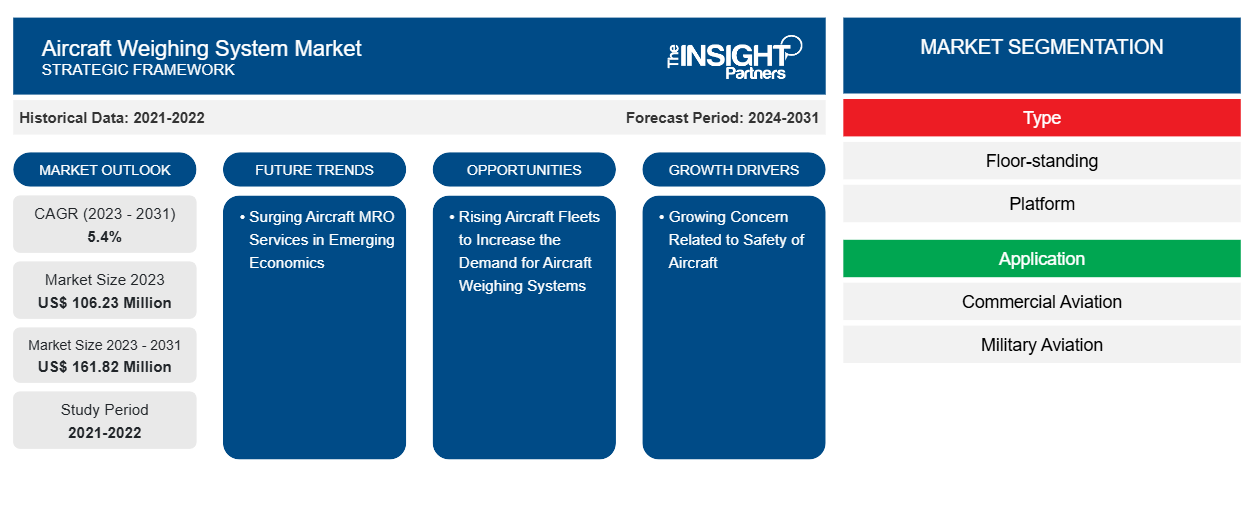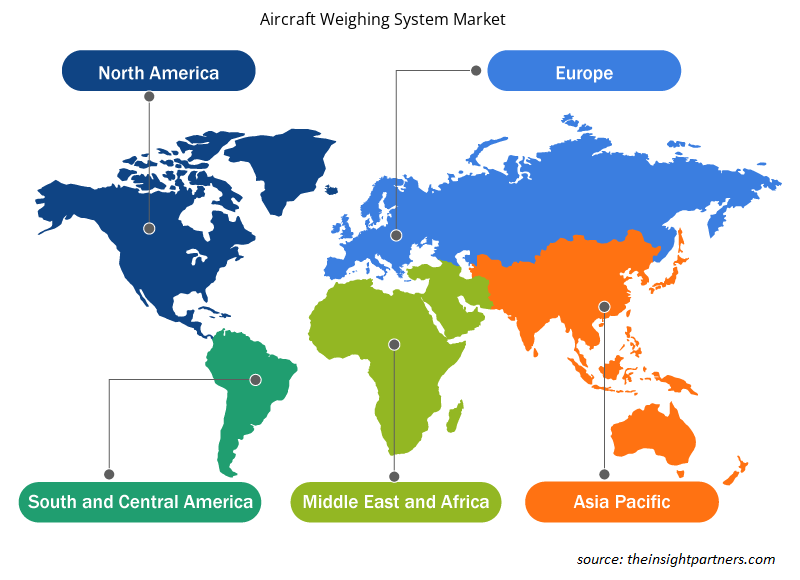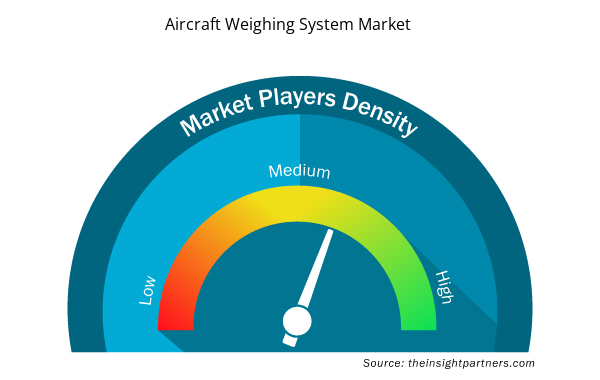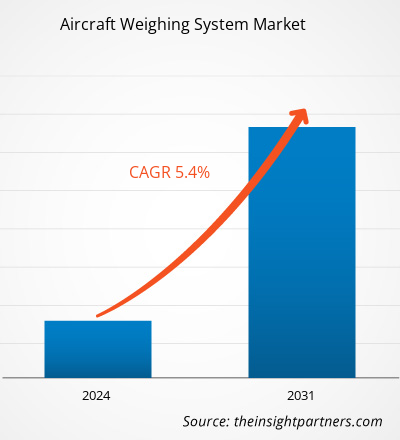The aircraft weighing system market size is projected to reach US$ 161.82 million by 2031 from US$ 106.23 million in 2023. The market is expected to register a CAGR of 5.4% during 2023–2031. The surging aircraft MRO services in emerging economies are likely to remain a key trend in the market.
Aircraft Weighing System Market Analysis
Aircraft weighing scale manufacturers include Intercomp, Vishay Precision Group, and General Electrodynamics Corp, among others. The availability of a large number of component suppliers enables the aircraft weighing system manufacturers to choose the appropriate supplier. This enhances the supply chain of components. Upon procuring components, the aircraft weighing system OEMs produce significant volumes of aircraft weighing systems, thereby meeting respective customer demands. The end users include aircraft OEMs, MRO providers, and military forces. Aircraft OEMs such as Airbus and Boeing, aircraft MROs such as AAR Corporation and Lufthansa Technik, and military forces procure aircraft weighing systems from the manufacturers. With the growing production rate of commercial and military aircraft, the demand for aircraft weighing systems is expected to increase steadily during the forecast period.
Aircraft Weighing System Market Overview
The aircraft weighing system market ecosystem comprises stakeholders, such as component suppliers, aircraft weighing scale manufacturers, and end users. The manufacturers continuously procure various components, such as displays, sensors, and pads, from the components suppliers in order to manufacture an aircraft weighing system to meet the mounting requirements of the customers.
Customize This Report To Suit Your Requirement
You will get customization on any report - free of charge - including parts of this report, or country-level analysis, Excel Data pack, as well as avail great offers and discounts for start-ups & universities
Aircraft Weighing System Market: Strategic Insights

- Get Top Key Market Trends of this report.This FREE sample will include data analysis, ranging from market trends to estimates and forecasts.
You will get customization on any report - free of charge - including parts of this report, or country-level analysis, Excel Data pack, as well as avail great offers and discounts for start-ups & universities
Aircraft Weighing System Market: Strategic Insights

- Get Top Key Market Trends of this report.This FREE sample will include data analysis, ranging from market trends to estimates and forecasts.
Aircraft Weighing System Market Drivers and Opportunities
Growing Concerns Related to the Safety of Aircraft to Favor Market
The risk of having a weight-related accident with cargo flights is much higher than passenger flights due to errors in the load sheet and incorrect loading. Various prominent aircraft weighing system market players are actively involved in developing and producing efficient weighing systems for all types of aircraft. The involvement of various companies in designing an efficient aircraft weighing system and significant emphasis from governments on avoiding aircraft accidents from various factors are the parameters propelling the demand for aircraft weighing systems across all regions, thereby catalyzing the aircraft weighing scale.
Rising Aircraft Fleets to Increase the Demand for Aircraft Weighing Systems
Several manufacturers across all regions are highly focused on creating wide-ranging, next-generation air transport systems with flexibility and cost-effectiveness. Major aircraft OEMs such as Airbus and Boeing are presenting tremendous opportunities to the aircraft weighing system market players. The aircraft would enable operators to open new long-haul services, chiefly on less heavily traveled routes such as China to Australia or India to Europe. Further, the opening of Boeing and Airbus manufacturing/assembly plants in various countries of Asia and upcoming indigenous regional commercial and regional aircraft such as COMAC C919 and Mitsubishi MRJ would continue to boost the aircraft weighing system market in the coming years.
Aircraft Weighing System Market Report Segmentation Analysis
Key segments that contributed to the derivation of the aircraft weighing system market analysis are type and application.
- Based on the type, the aircraft weighing system market is divided into floor-standing and platform. The floor-standing segment held a larger market share in 2023.
- Based on the application, the aircraft weighing system market is divided into commercial aviation and military aviation. The commercial aviation segment held a larger market share in 2023.
Aircraft Weighing System Market Share Analysis by Geography
The geographic scope of the aircraft weighing system market report is mainly divided into five regions: North America, Asia Pacific, Europe, Middle East & Africa, and South & Central America.
The scope of the aircraft weighing system market report encompasses North America (the US, Canada, and Mexico), Europe (Russia, the UK, France, Germany, Italy, and the Rest of Europe), Asia Pacific (South Korea, India, Australia, Japan, China, and the Rest of Asia Pacific), the Middle East & Africa (Saudi Arabia, South Africa, the UAE, and the Rest of Middle East & Africa), and South & Central America (Argentina, Brazil, and the Rest of South & Central America). In terms of revenue, North America dominated the aircraft weighing system market share in 2023. Europe is the second-largest contributor to the global aircraft weighing system market, followed by Asia Pacific.
Aircraft Weighing System Market Regional Insights
The regional trends and factors influencing the Aircraft Weighing System Market throughout the forecast period have been thoroughly explained by the analysts at Insight Partners. This section also discusses Aircraft Weighing System Market segments and geography across North America, Europe, Asia Pacific, Middle East and Africa, and South and Central America.

- Get the Regional Specific Data for Aircraft Weighing System Market
Aircraft Weighing System Market Report Scope
| Report Attribute | Details |
|---|---|
| Market size in 2023 | US$ 106.23 Million |
| Market Size by 2031 | US$ 161.82 Million |
| Global CAGR (2023 - 2031) | 5.4% |
| Historical Data | 2021-2022 |
| Forecast period | 2024-2031 |
| Segments Covered |
By Type
|
| Regions and Countries Covered | North America
|
| Market leaders and key company profiles |
Aircraft Weighing System Market Players Density: Understanding Its Impact on Business Dynamics
The Aircraft Weighing System Market is growing rapidly, driven by increasing end-user demand due to factors such as evolving consumer preferences, technological advancements, and greater awareness of the product's benefits. As demand rises, businesses are expanding their offerings, innovating to meet consumer needs, and capitalizing on emerging trends, which further fuels market growth.
Market players density refers to the distribution of firms or companies operating within a particular market or industry. It indicates how many competitors (market players) are present in a given market space relative to its size or total market value.
Major Companies operating in the Aircraft Weighing System Market are:
- General Electrodynamics Corp
- Henk Maas Weegschalen BV
- Intercomp Company
- Jackson Aircraft Weighing Systems LLC
- Langa Industrial S.A.
- Vishay Precision Group, Inc.
Disclaimer: The companies listed above are not ranked in any particular order.

- Get the Aircraft Weighing System Market top key players overview
Aircraft Weighing System Market News and Recent Developments
The aircraft weighing system market is evaluated by gathering qualitative and quantitative data post primary and secondary research, which includes important corporate publications, association data, and databases. A few of the developments in the aircraft weighing system market are listed below:
- Intercomp, a producer of portable vehicle weighing and measurement products, has announced the introduction of its LTR788 Dual Platform Scale to the global industrial scale market. The LTR788 is NTEP Certified for commercial vehicle weight enforcement. (Source: Intercomp Company, Press Release, April 2024)
- Intercomp Company received a contract from Airborne Maintenance MRO to provide an AC60-LP aircraft weighing scale system. (Source Intercomp Company, Press Release, August 2020)
Aircraft Weighing System Market Report Coverage and Deliverables
The “Aircraft Weighing System Market Size and Forecast (2021–2031)” report provides a detailed analysis of the market covering below areas:
- Aircraft weighing system market size and forecast at global, regional, and country levels for all the key market segments covered under the scope
- Aircraft weighing system market trends as well as market dynamics such as drivers, restraints, and key opportunities
- Detailed PEST and SWOT analysis
- Aircraft weighing system market analysis covering key market trends, global and regional framework, major players, regulations, and recent market developments
- Industry landscape and competition analysis covering market concentration, heat map analysis, prominent players, and recent developments for the aircraft weighing system market
- Detailed company profiles
- Historical Analysis (2 Years), Base Year, Forecast (7 Years) with CAGR
- PEST and SWOT Analysis
- Market Size Value / Volume - Global, Regional, Country
- Industry and Competitive Landscape
- Excel Dataset


- Lyophilization Services for Biopharmaceuticals Market
- Nuclear Decommissioning Services Market
- Playout Solutions Market
- Digital Pathology Market
- Collagen Peptides Market
- Sleep Apnea Diagnostics Market
- Extracellular Matrix Market
- Hydrogen Compressors Market
- Personality Assessment Solution Market
- Formwork System Market

Report Coverage
Revenue forecast, Company Analysis, Industry landscape, Growth factors, and Trends

Segment Covered
Type , Application

Regional Scope
North America, Europe, Asia Pacific, Middle East & Africa, South & Central America

Country Scope
Argentina, Australia, Brazil, Canada, China, France, Germany, India, Italy, Japan, Mexico, Russian Federation, Saudi Arabia, South Africa, South Korea, United Arab Emirates, United Kingdom, United States
Frequently Asked Questions
Which region dominated the aircraft weighing system market in 2023?
North America dominated the Aircraft Weighing System market in 2023.
What are the future trends of the Aircraft Weighing System market?
The surging aircraft MRO services in emerging economies are the future trend of the aircraft weighing system market.
Which are the leading players operating in the Aircraft Weighing System market?
General Electrodynamics Corp, Intercomp Company, Henk Maas Weegschalen BV, Jackson Aircraft Weighing Systems LLC, Langa Industrial S.A., Vishay Precision Group, Inc., Teknoscale OY, Nicol Scales & Measurement, McCoy Global Inc., HKM Messtechnik are some of the leading players in the market.
What would be the estimated value of the aircraft weighing system market by 2031?
US$ 161.82 million estimated value of the aircraft weighing system market by 2031.
What is the expected CAGR of the aircraft weighing system market?
5.4% is the expected CAGR of the aircraft weighing system market.

 Get Free Sample For
Get Free Sample For